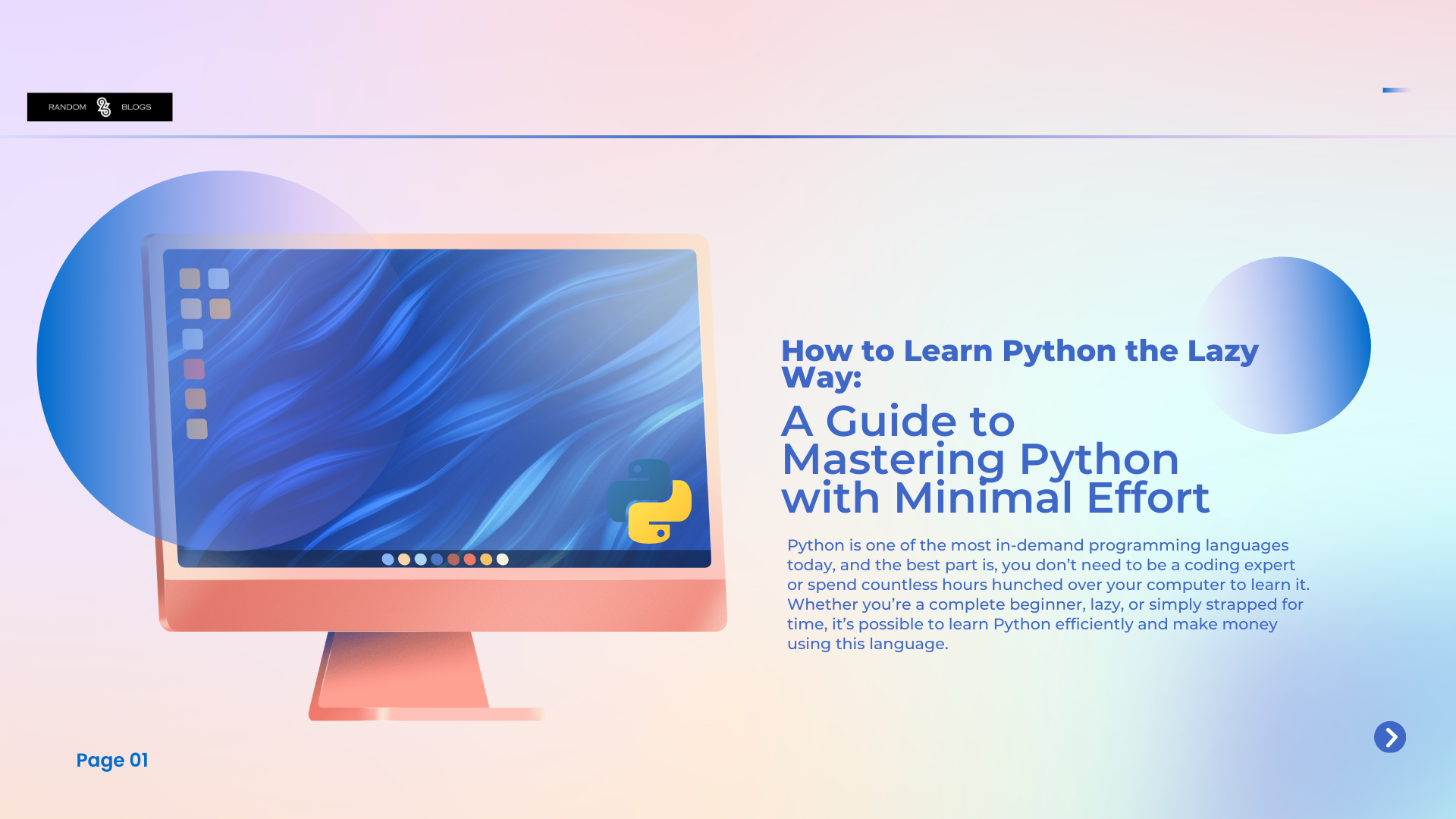
Table of Contents
Python is one of the most in-demand programming languages today, and the best part is, you don’t need to be a coding expert or spend countless hours hunched over your computer to learn it. Whether you’re a complete beginner, lazy, or simply strapped for time, it’s possible to learn Python efficiently and make money using this language.
You might be asking yourself, “Why should I bother learning Python when I can use tools like ChatGPT or AI code editors to generate code for me?” While it’s true that AI is great for generating simple code snippets, it’s still not advanced enough to tackle complex projects that involve innovation and creativity. Python developers are still needed for complex systems, new applications, and solving unique problems — the types of projects where AI will continue to struggle because it’s built on older datasets. So, to stand out in the job market, build high-quality projects, and get paid, you need to know Python, especially the parts where AI falls short.
In this guide, I’ll show you the laziest way to learn Python without getting stuck in endless tutorials and make you a confident developer ready to take on the world of coding.
1. Sign Up for Interactive Courses
Let’s face it, learning a programming language by just reading books or watching videos is hard to stick with — especially if you’re lazy. To make things easier and more engaging, sign up for an interactive, paid programming course. Platforms like DataCamp and Codecademy offer Python courses where learning is turned into a game. You’ll earn points, complete challenges, and work through quizzes after watching tutorials. This method forces you to apply what you learn immediately, ensuring you don’t just passively watch, but actually code.
When I first started learning Python, I had no idea how to even set up a basic coding environment. I didn’t know what REPL was or how to install Python on my machine. These platforms made the learning curve bearable. They walked me through the basics of syntax, how to write functions, and other essential programming concepts — all without overwhelming me.
Pro Tip: Stick to interactive platforms rather than purely video-based learning. You can move at your own pace, and you won’t fall asleep while a tutorial drones on!
2. Watch YouTube Tutorials (But Don’t Expect to Learn Everything)
YouTube is a fantastic resource for finding free Python tutorials, but let’s be honest, just watching someone code isn’t going to magically make you a Python developer. However, these videos can help you understand concepts, visualize code in action, and provide inspiration.
For example, YouTube can show you how Python developers use different tools and libraries like Pandas, NumPy, or Flask. Even if you’re not coding along, watching someone else build a project can give you insights and ideas for your own projects. That said, don’t expect YouTube tutorials to replace actual practice — think of it as a movie: fun to watch, but you won’t remember every line of code.
3. Start Small: Build Simple Projects First
Once you’ve got the basics down, it’s time to start coding. But here’s the trick: don’t start with an overwhelming project. Start with something small and simple, like a command-line interface (CLI) game or a basic data visualization.
For instance, one of my first Python projects was a simple number guessing game. It didn’t require advanced skills, but it helped me understand user inputs, loops, and basic logic. After completing that, I felt more confident and moved on to slightly bigger projects like building a basic web scraper.
Remember, the goal isn’t to make a million-dollar app in your first week. It’s to keep learning by tackling small, manageable problems. If you get frustrated with one project, don’t be afraid to switch gears and work on something else — as long as you’re coding, you’re making progress.
4. Master Key Python Concepts
Python has a lot of built-in features that many new developers overlook. By understanding and mastering these key concepts, you can write cleaner, more efficient code with fewer lines. Here are a few must-know features:
- Object-Oriented Programming (OOP): Learn how to organize your code into reusable objects and classes.
- Exception Handling: Understand how to manage errors effectively without crashing your program.
- File Processing: Learn how to read from and write to files, which is crucial for automating tasks.
- Decorators: These are Python’s magic functions that can modify other functions, making your code more flexible.
- Data Classes & Typed Dictionaries: These allow you to write cleaner, self-documenting code and enforce type checking.
By embracing these advanced concepts, you’ll be able to accomplish more with less effort — and impress recruiters or potential clients.
5. Join Python Communities for Motivation
Learning alone can feel isolating, especially if you’re prone to laziness. That’s why joining online communities can be a game-changer. Platforms like Reddit, LinkedIn, Facebook groups, Slack channels, and Discord servers are filled with Python enthusiasts who share knowledge, answer questions, and provide support.
These communities can help you stay updated on the latest trends in Python development, introduce you to new libraries and tools, and even help you discover job opportunities. If you get stuck on a problem, you can simply ask the community for help instead of banging your head against the keyboard for hours.
Plus, coding with friends is fun! Consider creating a Discord group with friends or colleagues where you can work on projects together through live calls.
6. Automate Boring Stuff
We all want to save time and effort, right? Python is famous for being an excellent tool for automating repetitive tasks, making it the perfect programming language for lazy people.
For example, I’ve automated a lot of my work using Python. I built a script that takes information from a Google spreadsheet, cleans up HTML code, and creates a new file with the necessary metadata for publishing blogs. Now, instead of spending hours on manual work, my Python script does 60% of it for me in minutes.
From automating emails, organizing files, to scraping data from websites, Python can make your day-to-day tasks easier. “Automate the Boring Stuff with Python” is a fantastic resource if you want to learn how to leverage Python to make your life easier.
7. Build, Build, Build
The more projects you build, the better you’ll get. Once you’ve completed a few small projects, it’s time to step up your game. Start a complex project like building a web server, creating a data analysis tool, or even developing your own software. Host your code on GitHub and learn version control with Git to collaborate with others and build a professional portfolio.
Remember, recruiters and hiring managers love seeing real-world projects, not just tutorials. By working on open-source projects or hosting your own code publicly, you’ll stand out from other applicants. Building production-ready code isn’t easy, but with time and effort, you’ll get there.
Automate the Boring Stuff with Python
Python isn’t just a coding language for developers — it’s a tool that can be used by anyone, even lazy people, to build amazing things and earn money. Start with the basics, use interactive courses to make learning fun, and work on real projects to build your confidence and skills.
As you progress, don’t forget to document your journey. Write about your experiences on platforms like LinkedIn or Medium, and share your projects with the world. Over time, you’ll develop a solid portfolio, and who knows? You might just fall in love with Python and thank me for showing you the lazy but effective way to learn it.
Ready to make some money? Start learning Python today!






